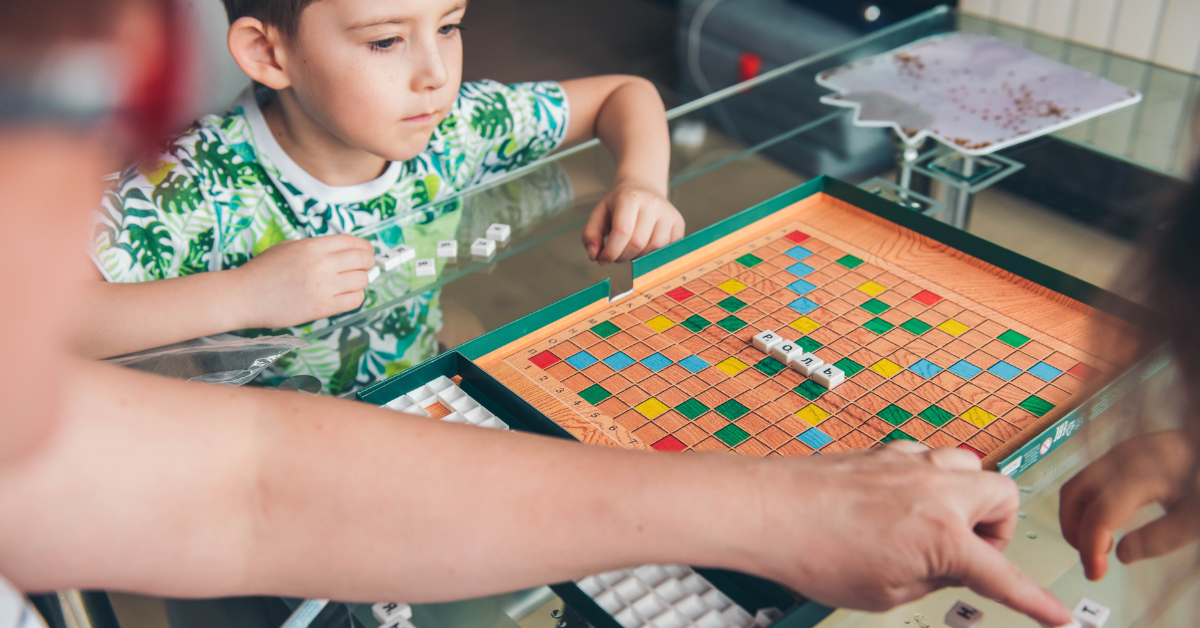
The English language is a panoply of arcane rules, weird consonant blends, and downright peculiar spelling.
Thanks to silent letters, for example, parents and teachers might find themselves struggling to answer difficult questions about words like “gnat,” “knight,” or “debt.” Likewise, finding easy answers for why a word like “dome” rhymes with “tome” but not “some” can be tough.
And speaking of “tough,” why isn’t it spelled “tuff”? Or even “tuph”? Good luck trying to explain that one.
Yet, if they’re going to learn to read, kids must practice spelling at a young age. While younger children may not have to worry about silent letters or phonetic anomalies as they learn basic spelling, older kids must find ways to untangle these abstract and confusing rules to elevate their spelling skills.
The good news is there is an answer to all these issues: games. By playing fun spelling games, instructors can use kids’ innate love of play to make spelling practice more engaging.
The Power of Play in the Learning Process
Focusing on the abstract analytical skills necessary to learn how to spell can be difficult for young children, which is why spelling games can be so helpful.
Kids naturally learn through play. While talking and showing can effectively impart wisdom and knowledge, kids, both young and old, tend to absorb lessons more readily when they interact with their environment through play.
Spelling games can take many different forms, from individual or paired games to classroom games or from simple spelling games to more complicated ones. Some spelling games may use physical objects like alphabet blocks or fridge magnets. Others might only involve writing or saying each letter of the word.
Which Spelling Skills to Practice
When you think about it, spelling a word requires command of many complex skills, not just one or two. Younger kids require letter recognition and recall but must also employ cognitive association to form words and phonological understanding to articulate them orally. The older we get, the more complex our spelling skills become. Older students have to employ the same skills as younger ones, but over the course of a sentence or paragraph, they may also need to apply critical thinking to enhance their skills. For example, understanding the concept of affixes (and how to spell them) can help older students distinguish those parts of a word from its root (think “untangle,” “retool,” or “guessing”).
Even if every one of these skills is involved and utilized, students may still not spell the word correctly. This is why the first rule of spelling games is ensuring the entire word is spelled correctly. As for skill development, spelling games should help students:
- Correctly spell the word on paper to build visual memory and recognition.
- Correctly spell the word orally to build auditory processing.
- Identify spelling patterns to enhance recall.
- Correctly sound out words to build phonemic awareness when guessing how a word is spelled from the first letter to the last letter.
Examples of Fun Spelling Games
While spelling isn’t all fun and games, there’s no reason a spelling game can’t be fun. There are many different spelling games for kids to play, but most are based on spelling stages. There’s a good reason for this; five-year-olds might be better positioned for success by spelling “cat” than “hippopotamus.”
“CVC” words (consonant/vowel/consonant) such as “big,” “run,” and “top” are a big category for young learners. These first words mostly follow the same fixed spelling rules and are perfect starting exercises for new spellers.
Here are a couple of examples of fun CVC spelling games:
CVC Match
Students are given a list of words like “dog,” “cat,” and “sun” and must match words to a set of images. A variation of this game for younger learners is to focus on specific vowels or consonants. For example, beneath an image of a dog, you might write out “d_g.” The student chooses from a list of letters and fills in the one that’s missing. For each right answer, the student gets a point, and a certain number of points wins a prize. This game can be done on a whiteboard or blackboard or using a corkboard with pinned words or letters and pictures.
Silly Words
Students are given a list of real and nonsensical words and must match them to one of two categories: real and silly. Like the CVC Match game, students get points toward a prize for each right answer.
While those games are great for young spellers, certain games can be used for practically any vocabulary set:
Writing Pictionary
You can play this fun game once your students have a basic working vocabulary and can recognize words from visual representations alone. Break students into groups. One group member draws a picture while the other students in the group collaborate and guess what the picture is. Students must not only guess the correct word, but they must also spell it correctly. The first team to do both wins the round.
Word Scramble Game
This one is for the older kids. Write a short sentence on the board: “I like strawberry ice cream.” Then have students make words out of the letters in the sentence. For example, they could spell out the word “bike” because “b,” “i,” “k,” and “e” are all in the sentence. This game is particularly effective because it practices active recall, which is proven to be one of the best ways to learn and retain information.
“Magic E” is the rule that transforms words like “rip” into “ripe” and “kit” into “kite.”
Sit Down, Stand Up
One great example of a classroom game that can help advancing spellers reinforce the “Magic E” concept is Sit Down, Stand Up. In this game, students must recognize which words have the Magic E and which do not. The students start this game while seated or at their desks. The instructor then slowly recites a list of simple words, including some Magic E words. If the word contains a Magic E, the students must stand up. If it does not, they must sit down. This fun spelling game practices listening for vowel sounds and connecting them to the last letter, and it’s also great for getting young kids out of their seats and moving.
You can also find spelling games online. Web-based spelling games are a great collective resource for teachers and parents alike. Classic word games like Hangman and Scrabble are popular for a reason and are among the best online spelling games. Just be sure to adjust the spelling words to your students’ ability level.
Incorporating Spelling Practice into Daily Life
Spelling words are everywhere: on the computer, at the bus station, in the supermarket, and practically everywhere else that requires human communication. At school, there are plenty of opportunities: school offices, the gymnasium, the cafeteria, and, of course, classrooms.
Just about everything you see or hear has a word associated with it. This means there is no shortage of possibilities for incorporating spelling practice into daily life. Beyond simply learning to spell a word correctly, students also see it in context, which helps build their vocabulary.
Bringing Fun to Spelling
Spelling activities of all kinds can go a long way toward helping students learn what is, cognitively, a challenging skill. By focusing on play rather than drilling, flashcards, or memorization, learning to spell is much more engaging and productive.
Feel free to experiment and adapt the games for your own purposes. Even slight modifications to these spelling games can make a world of difference, depending on the learner. Instead of using whiteboards, for example, you could turn the activity into a multisensory experience by having students trace with their fingers in flour or sand. Small changes can make great spelling games even better.
Take the Spelling You See placement test today and discover the right level to support your child’s spelling journey!




Leave a Reply